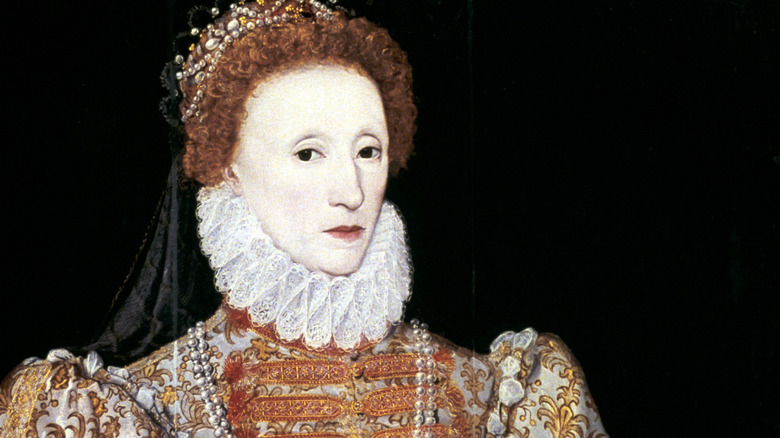A Look At The Link Between Queen Elizabeth I And Shakespeare
William Shakespeare and Queen Elizabeth I are two of history's most well-known and influential figures. As they both walked the Earth at the same time, there has been a long enduring theory that the two may have met during their lives. Because of the proximity to each other as well as their positions within society, it is completely plausible that the two had some sort of relationship. Was it platonic? Was it romantic? Or was it combative and competitive? According to Biography, artists and historians alike have been trying to figure out the exact nature of the queen's relationship with Shakespeare and have come up with various possibilities.
There are many possible reasons as to why or how Shakespeare and Queen Elizabeth met. One of the biggest things that supports this is the simple fact that the queen was a huge patron of the arts. As such, theater troupes like the one Shakespeare performed in would perform for her on a regular basis. According to Shakespeare Birthplace Trust, there were at least two Shakespeare plays performed for Queen Elizabeth — "Merry Wives of Windsor" and "Love's Labour's Lost." Legend actually says that the "Merry Wives of Windsor" was actually written at the behest of the queen herself. Of course, it would make sense that the two probably met at some point during one of these performances.
Acquaintances at best
While the evidence seems to insinuate that William Shakespeare and Queen Elizabeth likely met each other during their lives, they probably weren't besties or anything. Shakespeare does allude to her majesty quite affectionately in his play "A Midsummer Night's Dream," as stated by Spark Notes. Despite this, there is little evidence that would support the two having any sort of deep or complex relationship. If you take into consideration the queen's age alone, the pair likely did not have much in common outside their love of theater.
As much as people have speculated over the centuries about Shakespeare's relationship with Queen Elizabeth, according to Biography, it was his relationship with her successor that was a bit more interesting. When Elizabeth I died on March 24, 1603, she was succeeded on the throne by James I, son of her cousin, Mary, Queen of Scots. Shortly after he was crowned, Shakespeare's acting troupe, The Lord Chamberlain's Men became The King's Men, and Shakespeare became a "groom of the chamber." James I enjoyed the theater, and as a result, actually ended up seeing more Shakespearean performances than his predecessor. Though the full extent of Shakespeare's relationship with the queen will likely remain a mystery, the two left their mark on the history books nonetheless.

